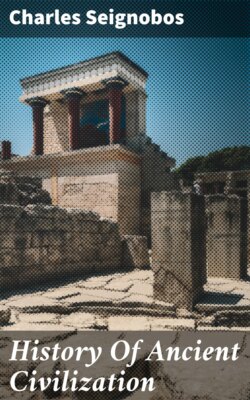Читать книгу History Of Ancient Civilization - Charles Seignobos - Страница 36
На сайте Литреса книга снята с продажи.
PRIMITIVE RELIGION OF THE HINDOOS
ОглавлениеThe Aryans on the Indus.—About 2,000 years before our era some Aryan tribes traversed the passes of the Hindu-Kush and swarmed into India. They found the fertile plains of the Indus inhabited by a people of dark skin, with flat heads, industrious and wealthy; they called these aborigines Dasyous (the enemy). They made war on them for centuries and ended by exterminating or subjecting them; they then gradually took possession of all the Indus valley (the region of the five rivers).[23] They then called themselves Hindoos.
The Vedas.—These people were accustomed in their ceremonies to chant hymns (vedas) in honor of their gods. These chants constituted a vast compilation which has been preserved to the present time. They were collected, perhaps, about the fourteenth century B.C. when the Aryans had not yet passed the Indus. The hymns present to us the oldest religion of the Hindoos.
The Gods.—The Hindoo calls his gods devas (the resplendent). Everything that shines is a divinity—the heavens, the dawn, the clouds, the stars—but especially the sun (Indra) and fire (Agni).
Indra.—The sun, Indra, the mighty one, "king of the world and master of creatures," bright and warm, traverses the heavens on a car drawn by azure steeds; he it is who hurls the thunderbolt, sends the rain, and banishes the clouds. India is a country of violent tempests; the Hindoo struck with this phenomenon explained it in his own fashion. He conceived the black cloud as an envelope in which were contained the waters of heaven; these beneficent waters he called the gleaming cows of Indra. When the storm is gathering, an evil genius, Vritra, a three-headed serpent, has driven away the cows and enclosed them in the black cavern whence their bellowings are heard (the far-away rumblings of thunder). Indra applies himself to the task of finding them; he strikes the cavern with his club, the strokes of which are heard (the thunderbolt), and the forked tongue of the serpent (the lightning) darts forth. At last the serpent is vanquished, the cave is opened, the waters released fall on the earth, Indra the victor appears in glory.
Agni.—Fire (Agni, the tireless) is regarded as another form of the sun. The Hindoo, who produces it by rapidly rubbing two pieces of wood together, imagines that the fire comes from the wood and that the rain has placed it there. He conceives it then as the fire of heaven descended to earth; in fact, when one places it on the hearth, it springs up as if it would ascend toward heaven. Agni dissipates darkness, warms mankind, and cooks his food; it is the benefactor and the protector of the house. It is also "the internal fire," the soul of the world; even the ancestor of the human race is the "son of lightning." Thus, heat and light, sources of all life, are the deities of the Hindoo.
Worship.—To adore his gods he strives to reproduce what he sees in heaven. He ignites a terrestrial fire by rubbing sticks, he nourishes it by depositing on the hearth, butter, milk, and soma, a fermented drink. To delight the gods he makes offerings to them of fruits and cakes; he even sacrifices to them cattle, rams and horses; he then invokes them, chanting hymns to their praise. "When thou art bidden by us to quaff the soma, come with thy sombre steeds, thou deity whose darts are stones. Our celebrant is seated according to prescription, the sacred green is spread, in the morning stones have been gathered together. Take thy seat on the holy sward; taste, O hero, our offering to thee. Delight thyself in our libations and our chants, vanquisher of Vritra, thou who art honored in these ceremonies of ours, O Indra."
The Hindoo thinks that the gods, felicitated by his offerings and homage, will in their turn make him happy. He says naïvely, "Give sacrifice to the gods for their profit, and they will requite you. Just as men traffic by the discussion of prices, let us exchange force and vigor, O Indra. Give to me and I will give to you; bring to me and I will bring to you."
Ancestor Worship.—At the same time the Hindoo adores his ancestors who have become gods, and perhaps this cult is the oldest of all. It is the basis of the family. The father who has transmitted the "fire of life" to his children makes offering every day at his hearth-fire, which must never be extinguished, the sacrifice to gods and ancestors, and utters the prayers. Here it is seen that among Hindoos, as among other Aryans, the father is at once a priest and a sovereign.
